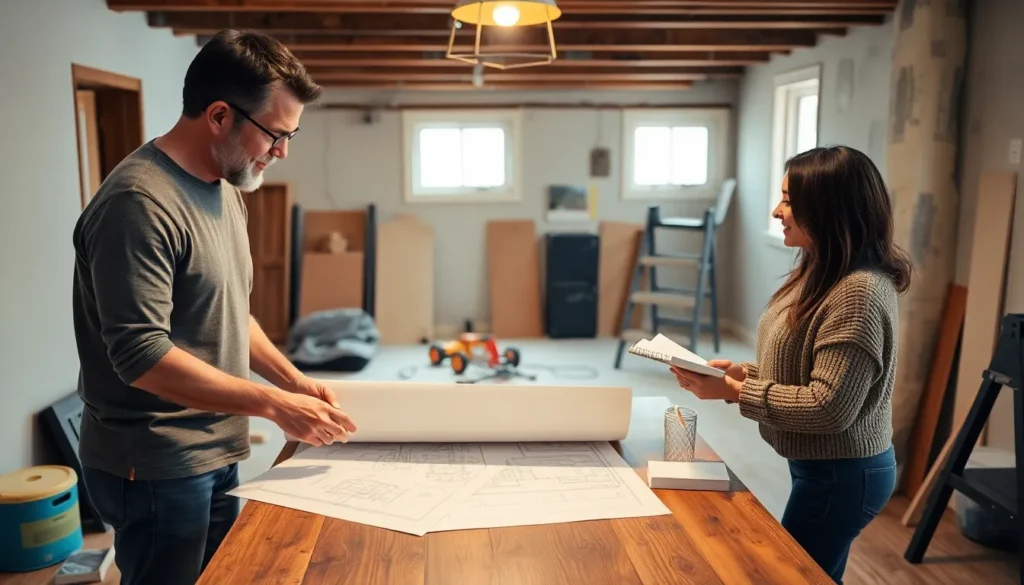Table of Contents
ToggleThinking about transforming that dark, musty basement into a stylish hangout or a cozy guest suite? You’re not alone! Basement renovations are the secret weapon for homeowners looking to maximize space and value. But before diving headfirst into the world of drywall and decor, it’s crucial to understand the costs involved.
Understanding Basement Renovations Cost
Basement renovations involve various factors, influencing overall costs. Understanding these elements helps homeowners budget effectively.
Factors Influencing Costs
Location significantly affects renovation expenses. Urban areas generally incur higher labor and material costs. The scope of the renovation can dictate the budget as well. A simple finish requires fewer resources than installing a bathroom or a kitchen. Quality of materials also plays a key role. High-end finishes lead to increased costs, while standard materials offer budget-friendly options. Design complexity further contributes to expenses. Unique layouts or structural changes escalate renovation efforts, impacting the total price.
Average Cost Estimates
Renovation costs vary widely across projects. On average, basement renovations range from $20 to $50 per square foot. Homeowners can expect to spend between $10,000 and $25,000 for basic remodels. Adding a bathroom increases project costs by $6,000 to $15,000. Expansive renovations with high-end finishes can approach $50,000 or more, depending on features. Budgeting effectively requires detailed cost projections based on individual needs and desired updates.
Budgeting for Your Basement Renovation

Understanding costs plays a crucial role in planning a successful basement renovation. Homeowners need to anticipate expenses to avoid financial surprises down the road.
Setting a Realistic Budget
Setting a budget requires careful consideration of various factors. Location significantly impacts costs, with urban areas generally incurring higher expenses. Homeowners should determine the scope of the project first, which influences materials and labor. Estimate costs at $20 to $50 per square foot for renovations. Basic remodels typically range from $10,000 to $25,000, but depending on features, prices can escalate quickly. For those adding bathrooms, expect extra costs between $6,000 to $15,000. Therefore, aligning one’s expectations with personal finances ensures a smoother renovation process.
Hidden Costs to Consider
Hidden costs often catch homeowners off guard during renovations. Electrical and plumbing upgrades frequently require additional funding. Unforeseen repairs, such as mold remediation or structural adjustments, may also emerge. Homeowners should account for permit fees and inspections, which can add to the overall expense. Interior design and furnishing costs further complicate budgets, so planning for these aspects remains essential. Keeping a contingency fund, typically 10% to 20% of the total budget, provides a safety net for surprises. Prioritizing transparency in budgeting enables a successful and satisfying basement transformation.
Cost-Saving Tips for Basement Renovations
Homeowners can save money during basement renovations by implementing strategic choices. Identifying cost-effective methods starts with exploring do-it-yourself (DIY) options.
DIY Options
Taking on renovations independently can significantly lower costs. Homeowners, for example, can handle tasks like painting, flooring, or installing drywall. Skills in basic plumbing or electrical work can further reduce labor expenses. Many online resources and instructional videos provide guidance for DIY projects. Assessing personal capabilities allows homeowners to determine which tasks to tackle and which to delegate. Choosing DIY approaches not only saves money but also adds a personal touch to the renovation.
Choosing Affordable Materials
Selecting budget-friendly materials is essential for managing renovation costs. Flooring options such as laminate or vinyl mimic expensive materials without high prices. Prioritizing engineered wood over solid wood can also cut expenses. Choosing durable yet affordable fixtures ensures aesthetic appeal while minimizing replacement needs. Researching local suppliers may reveal discounts on bulk materials or clearance items. Homeowners should consider convenience and practicality when selecting finishes and fixtures, balancing quality and cost-effectiveness to stay within budget.
Hiring Professionals vs. DIY
Homeowners often face the choice between hiring professionals and taking a DIY approach for basement renovations. Each option carries distinct advantages and potential drawbacks.
Pros and Cons of Hiring Contractors
Hiring contractors brings expertise and efficiency to the renovation process. Professionals provide knowledge of building codes and regulations, ensuring compliance and minimizing the risk of costly mistakes. They possess access to specialized tools and materials, enhancing the quality of the finish. Experience in project management allows them to streamline timelines, reducing overall renovation duration. On the downside, labor costs contribute significantly to the total budget. Homeowners should anticipate paying upwards of 30% of the overall project cost toward professional services. Delays can also arise due to scheduling or unforeseen circumstances, impacting progress.
When to Consider Professional Help
Professional help becomes crucial when tackling complex projects such as plumbing or electrical work. These tasks often require licensed practitioners to ensure safety and compliance. Additionally, extensive renovations that demand structural changes benefit from expert oversight. Lack of experience with permits and inspections may lead to delays or additional expenses. Homeowners aiming for high-end finishes, like custom cabinetry or intricate designs, often find that professional skills enhance the overall aesthetic. Assessing personal skills and available time plays a significant role in this decision. For many, hiring professionals provides peace of mind and a higher-quality end result.
Basement renovations can significantly enhance a home’s value and livability. Understanding the costs involved is crucial for homeowners embarking on this journey. By carefully considering factors like location and project scope, they can create a realistic budget that accommodates potential surprises.
Whether opting for professional help or tackling DIY tasks, each choice carries its own set of benefits and challenges. With proper planning and a keen eye on expenses, homeowners can achieve a beautiful and functional basement that meets their needs without breaking the bank.







